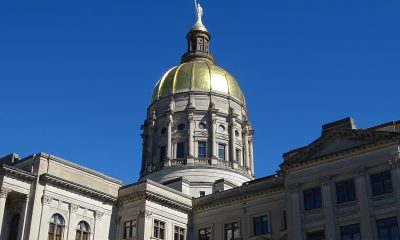Arts & Entertainment
Imagine Dragons’ Reynolds takes LGBTQ advocacy to Washington
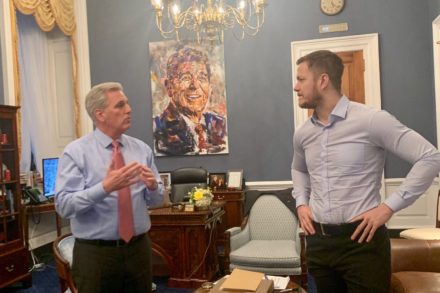
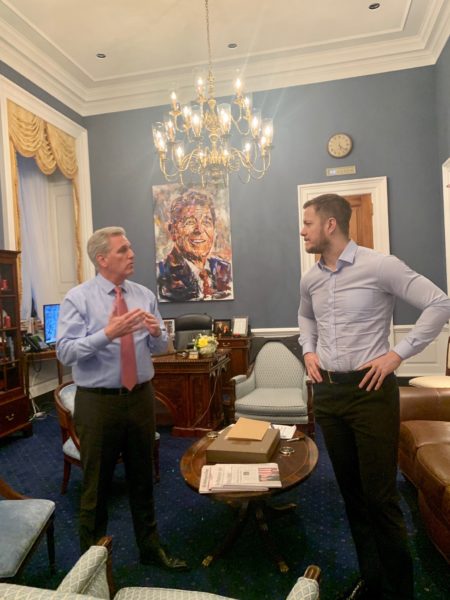
Dan Reynolds (R) meets with Rep. Kevin McCarthy of California’s 23rd District (Photo via Twitter)
Dan Reynolds is not gay, but he takes being an LGBTQ ally very seriously.
The Imagine Dragons frontman has long been a fierce and dedicated advocate for LGBTQ acceptance, something he recently took to the next level by heading to Washington, DC, to meet with federal lawmakers about implementing a nationwide ban on so-called “conversion therapy.”
Reynolds, joined by Neon Trees’ Tyler Glenn and “RuPaul‘s Drag Race” star Carmen Carrera, met earlier this month with several lawmakers, including Rep. Sean Patrick Maloney, Co-Chair of the Congressional LGBT Equality Caucus, and Rep. Ted Lieu, a Vice-Chair of the Equality Caucus, at the U.S. Capitol, to lobby for a federal ban on conversion therapy. In his social media posts, Reynolds shared that they also spoke with Speaker Nancy Pelosi, Sen. Mitt Romney, and Rep. Kevin McCarthy among others.
After visiting with the lawmakers, Reynolds said, “Sadly it takes a straight man with a lot of privilege to come in as well, to actually get things done. And I think that’s a damn shame, in 2020 something you’d think would not be necessary. But it’s just a truth of the matter.”
Only 19 states currently ban conversion therapy, though Virginia’s State Senate last month passed a bill banning the practice and the state’s House of Representatives passed their version of the bill on Monday. The two versions will be reconciled into a final bill before being sent to Governor Ralph Northam to sign.
Reynolds’ LGBTQ became known for his LGBTQ activism in 2016, when he and Glenn became co-founders of the LOVELOUD Festival, to raise awareness to the issues impacting LGBTQ youth. In 2017, the Imagine Dragons singer started the LOVELOUD Foundation, as a way to “bring communities and families together to help ignite the vital conversation about what it means to unconditionally love our LGBTQ+ youth.”
Reynolds’ efforts were highlighted by the 2018 HBO-produced documentary, “Believer,” which follows the musician’s mission to confront the Mormon Church over its discriminatory policies toward LGBTQ individuals while documenting the first LOVELOUD Festival in Orem, Utah. The film was nominated for a 2018 Emmy and won the Best Documentary prize at GLAAD’s 30th Annual Media Awards.
Reynolds, Glenn, and Carrera hosted a screening of the documentary in Washington in conjunction with their meetings with elected officials.
When Imagine Dragons took the Best Rock Artist Award at the 2019 Billboard Music Awards, Reynolds used his entire acceptance speech to speak up about the issue of conversion therapy and its harmful effect on LGBTQ youth.
“I just want to take this moment to say that there are 34 States that have no laws banning conversion therapy,” the rocker said. “And on top of that, 58 percent of our LGBTQ population live in those states. This can change, but it’s going to take all of us talking to our state legislators, pushing forward laws to protect our LGBTQ youth.”
Movies
Closeted cop struggles with an undercover life in ‘Plainclothes’
A mid-1990s tale of mall cruising with a twist
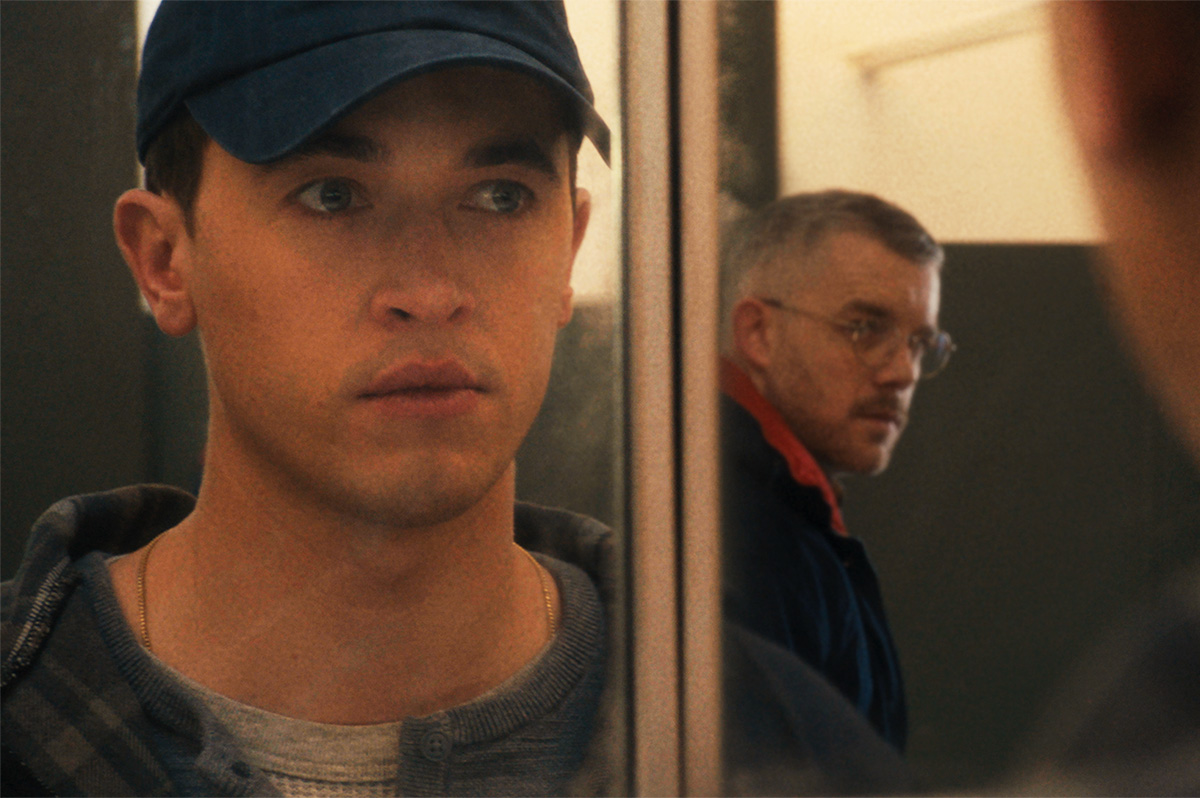
Once upon a time, before there were cell phone apps, gay men looking for a quick hook-up had to go out and find it in person.
Obviously, there are many of us still around who remember those days clearly enough (and frequently with a considerable degree of fondness), but generations who came of age after the advent of Grindr may not have a full enough picture of what it was like to understand the thrill of it – or the risk involved if you happened to get caught.
No matter which generational demographic you’re in, if you’re a gay man who has indulged in or even fantasized about “cruising” in a public space you will likely be drawn to “Plainclothes,” a Sundance Award-winning film from first-time director Carmen Emmi that opened in limited cities on Sept. 19 and expands for a wider release this weekend. Set in Syracuse of the mid-1990s, it offers a palpably personal – and uniquely double-sided – glimpse into the culture of anonymous gay sex that existed in that era, as well as the nerve-wracking tightrope of maintaining the semblance of “straightness” for our own safety despite the conflicts it ignites within our very nature.
That dual perspective comes because the film is centered on Lucas (Tom Blyth), a promising young police officer who has been assigned to work undercover in an ongoing “sting” operation targeting gay men at the local mall, using his good looks and “rough trade” charm to lure suspected cruisers into the men’s room and entrap them for public indecency. There’s just one problem: Lucas is gay himself, meticulously closeted both in his career and around his large working class family, and it’s becoming harder for him to dissociate himself from the persecution he’s helping to inflict against other guys just like him.
Things come to a breaking point when he finds himself attracted to one of his would-be targets, a distinguished-looking older “daddy” named Andrew (Russell Tovey) with a confident swagger that feels like a force of nature, and purposely fumbles the sting to protect him – but not before getting those all-important digits for a later connection. A clandestine romance begins, though Andrew has a double life of his own to maintain, and Lucas, weary from the ever-exhausting effort of keeping his true self hidden, finds himself increasingly at odds with the hypocrisy of his work. Adding an even greater urgency to the situation, a misplaced letter puts his secrets at risk, forcing him to face the very real possibility of being exposed as gay to everyone he knows.
Marked with a distinctly authentic feel for both the social environment around queerness and the particulars of cruising culture in its pre-millennial setting, “Plainclothes” avoids the pitfalls of pushing an agenda and the tropes of victimhood that often mar such stories about living in the closet, largely due to an unvarnished frankness that comes with the expression of lived experience. There’s an observational neutrality about it that lifts it out of the trenches of culture-war politics and frames its narrative as something personal, the story of one among the many rather than an invocation of shared political grievance.
This refreshing freedom from pointedly overt cultural messaging stems largely from the fact that, while it is not strictly autobiographical, “Plainclothes” is woven from the personal history of its filmmaker. As writer/director Emmi explains in the movie’s press notes, he was inspired to make it when his brother was becoming a police officer in 2016, and he learned of sting operations against gay men that were still being conducted, conjuring his own memories of what it was like to be newly out in the ‘90s, when the public stigma of being gay was still amplified by the AIDS crisis and police persecution – especially in smaller-town settings like his native Syracuse – was a constant worry.
“To process these feelings, I found myself reflecting on my childhood in Syracuse, NY, in the ’90s,” he says. “I remembered deepening my voice, lying about my favorite music and movies to appear more ‘masculine’ – more ‘straight.’ I realized that, shaped by societal expectations of what a man should be, I ‘policed’ my feelings and became my own harshest enforcer.”
He goes on to say, “Writing this story for my hometown was something I had to do. I wanted to honor the place that raised me, even if I hadn’t always felt I belonged. Revisiting key locations — my childhood mall, the Landmark Theater, the greenhouses where my grandfather taught me to pot flowers — felt essential.”
It’s that essential feeling that lends his movie the sense of in-person realness that eludes many such films; by making something that feels like a memoir, infused with emotional intimacy rather than deliberate messaging. He gives us the story of an individual trapped in the conflict between personal identity and professional responsibility, whose struggle to emerge expresses an individual truth without conflating it into a larger battle for acceptance, and that makes it seem all the more universal, a coming-out story we can all relate to in our own way, even if our own coming-out looked nothing like it.
Of course, it would not be as effective as it is were it not for Blyth’s performance in the lead role; convincingly embodying the smoothly nonchalant feigned “machismo” of his blue-collar cop persona while also navigating the inner awakening that’s sparked by his world-changing encounter in the men’s room at the mall, he carries the film squarely on his shoulders and delivers it with full conviction. As for Tovey, who seems here to have fully embraced the full-on “daddy” status that comes with his maturity, his Andrew is an enigma that peels slowly away as his own secrets come to light, and his chemistry with Blyth – with whom all of his scenes are shared – is both smouldering and tender. It should be mentioned that his role is more of a supporting turn, and that he has far less screen time than might be expected from his prominence in the film’s publicity campaign – but the presence he brings to it looms large enough to be tangible throughout the entire thing.
Coming at a time of dire uncertainty for queer existence in America, “Plainclothes” is certainly a film that’s aware of the importance of delivering queer narratives that both honor our humanity and remind us of what it’s like when we have to live in a world that requires us to disguise ourselves.
Thanks to Emmi’s focus on his own experiences of learning to navigate gayness in America, it succeeds with refreshing humility in achieving both objectives. It’s a small film, and one that feels even more intimate than its smallness might suggest, but that’s part of its winning strength. Better yet, although it doesn’t offer some unrealistic “happy ending” scenario or smooth over the pain and genuine risk of coming out in an environment where it doesn’t feel safe to do so, it leaves us with a feeling of relief, and a sense that things are always better when you don’t have to live your life undercover.
a&e features
The documentary ‘Dear Viv’ tells the story of a Queen and her community
The Vivienne’s Drag Race sisters speak about her legacy and the impact of drug abuse on the LGBTQ+ community
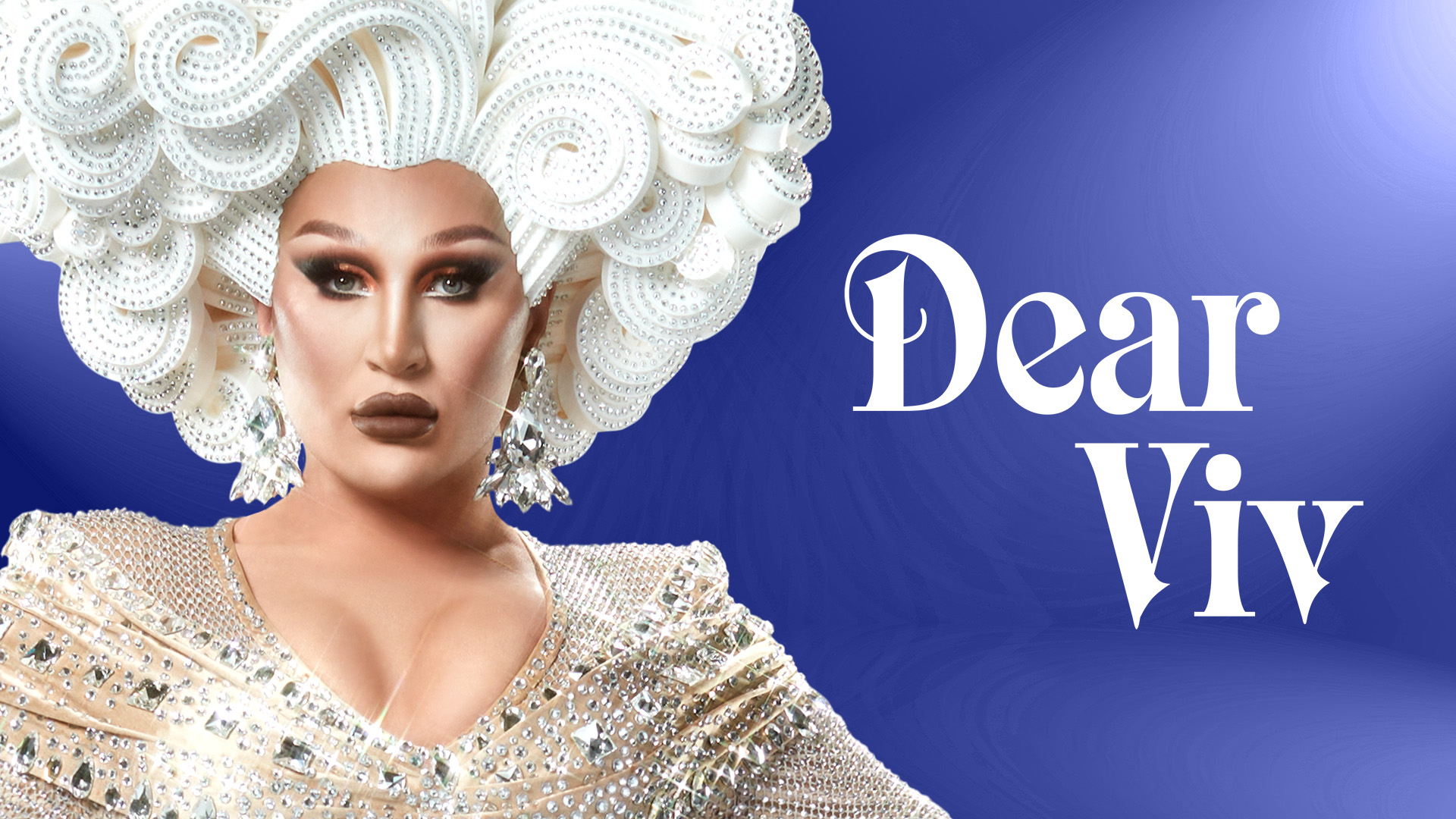
In a year filled with hardships for the LGBTQ+ community, few days have been as collectively devastating as when it was announced that The Vivienne, winner of RuPaul’s Drag Race UK and international superstar, had passed away.
The Vivienne’s impact transcended borders; after winning the inaugural season of Drag Race UK, the Queen broke barriers with her performances in theater and television. In just a few years, she became a mainstay of international queer culture, a rise to stardom that Pete Williams’ documentary Dear Viv does its best to honor.
The doc gathers The Vivienne’s loved ones to speak about her impact on modern culture and how devastating it was to lose such a powerful light in their lives. The feature is a beautiful memorial of a life taken too soon — and it’s also a call-to-action. Because the documentary details how The Vivienne’s struggles with addiction led to her death, it hopes to not only commemorate a legend but raise awareness of the rampant drug abuse that fills the queer community.
The Los Angeles Blade got the chance to sit down with some of the other UK stars featured in the documentary to hear not only what The Vivienne meant to them, but what they hope this legacy can do for thousands of LGBTQ+ individuals today.
“We always knew she was destined to be a star…and just to see her achieve her dreams, it couldn’t have happened to a better person,” said Michael Marouli, runner-up of Drag Race UK season five and long-time friend of The Vivienne. It was a sentiment shared by not only her close friends, but the late performer’s thousands of fans; viewers first met The Vivienne when she strutted onto Drag Race UK season one, marvelling with her talent before eventually winning and becoming the country’s first Drag Superstar. “Everything that she did from her crown onwards, she did it to the utmost excellence,” agreed Cheryl Hole, another series alumni who spoke in the documentary. “From her TV work to her theater runs…I knew the future was just going to be so bright and so full for her.”
And it was a bright future indeed, as The Vivienne’s tenure on Drag Race was followed up with appearances in other hit UK shows, features in multiple popular films, and even a starring role in the West End’s production of The Wizard of Oz. The early portion of Dear Viv highlights these successes and the hard work it took to achieve them, following its central figure as she grew from a teenager performing underage at drag bars to the iconic Queen fans know her as today. It emphasizes how she paved the way for so many other queer celebrities, making it all the more gut-wrenching when viewers remember what is to follow all this success.
Advocates have been speaking up for decades about the disastrous impact hard drugs have on the LGBTQ+ community. Since the 1970s, studies have shown how party-centric venues, being some of the only inclusive spaces, combined with mainstream society’s mistreatment of queer folk, make LGBTQ+ people particularly vulnerable to drug and alcohol addiction. It’s what has led queer communities to have some of the highest rates of drug addiction in the world — yet since this problem has gone largely unaddressed, many of the people facing this addiction are left to deal with these issues in solitude.
Dear Viv not only details the Queen’s multi-year struggle with addiction and the relapse that led to her death, but also how loved ones are using her legacy to save others from fighting their demons alone. The Vivienne’s blood sister, Chanel Williams, is leading the charge; not only has she appeared on numerous talk shows raising awareness around the dangers of ketamine, but she has created the House of The Vivienne, an addiction support group working to combat drug addiction in the UK’s queer community.
“I truly believe what Viv’s family are doing right now is incredible,” said Cheryl Hole, the usually sardonic Queen growing serious when discussing this important advocacy. “[This is] a place where people can come for narcotics, anonymous support, and truly take away the stigma of using drugs.” It’s a goal that has gone worldwide; in the months since The Vivienne’s death advocacy organizations across the U.S. have spotlighted the harmful impact of drug addiction and the role we all play in assisting LGBTQ+ people through recovery. It’s unfortunate that these resources were not available when The Vivienne herself needed them, but it’s why her loved ones are determined to help the countless others they know are struggling through the same fight she did.
Beyond anything else, Dear Viv is a heartwrenching, uplifting memoriam for someone who truly changed LGBTQ+ representation for the better. “Whether she was talking, whether she was performing, whether she was just there visually as a gorgeous presence, you were in safe hands with her,” continued Hole, tearfully describing how it was The Vivienne showing viewers that LGBTQ+ performers were just like them which allowed other UK Queens to achieve similar fame. And when it comes to her struggles with drug abuse and the advocacy her death has spurned on, the Queens echo in interview the documentary’s mission statement: reach out. There is help available even when it seems like there’s not, and people like The Vivienne’s family are fighting to make these resources more visible every single day.
While the entire documentary embodies this message of seeking help, nobody articulates it better than Michael Marouli themself. “I promise you it gets better when you speak to somebody,” said the Queen tearfully as her interview came to a close. “I can imagine how scary it is and how you might feel alone, but once you speak to someone, it does get better — I promise. So please, please, please, if you are struggling, seek the help you need. And there are people out there who are willing to do the work to get you where you need to be beautiful.”
A statement that The Vivienne would be proud of.
a&e features
David Hernandez on sobriety, vulnerability, and the power of music to heal
In honor of National Alcohol and Drug Addiction Recovery Month, American Idol finalist David Hernandez opens up about his own journey from addiction through sobriety and the importance of visibility, vulnerability, and community in the recovery process.

Fans remember David Hernandez as the velvet-voiced finalist who lit up American Idol season 7, but behind the glam of the bright lights is an artist on a deeply personal journey. In this candid convo, Hernandez opens up about sobriety, the healing power of music, and why vulnerability might just be the bravest thing you can wear (aside from sunscreen). With his latest single, “Feel It All,” Hernandez is hitting emotional truths and offering a bit of hope to anyone who’s ever felt like they were singing solo.
September is National Alcohol and Drug Addiction Recovery Awareness Month. What does that mean to you personally, and why is it important to bring public awareness to it?
It means a lot to me as someone who’s in recovery. There’s still a lot of stigma around admitting you have a problem, whether it’s alcoholism or addiction. Vulnerability is difficult because people can weaponize it, and that makes honesty really scary. It takes a lot of bravery and truth to be strong enough to share your story publicly.
I think it’s beautiful that there’s a month dedicated to people living with this affliction. It gives us visibility, and it gives others, who may not understand addiction, the chance to learn more. Awareness fosters empathy, and empathy leads to change.
Your single “Feel It All” explores themes of emotional pain and self-reclamation. How has acceptance played a role in your healing?
When you live in your truth and authenticity, you finally give yourself space to process and unpack trauma, whether it’s childhood, young adult, or current-day trauma. And there’s a lot of it just from existing in the world.
The hardest part is often being honest with yourself. We’re conditioned to push things down so we can hustle, present well, and avoid vulnerability. But being honest, with yourself first, starts the healing process. That honesty is the crux of recovery.
For me, it’s not just about being in recovery, but about being a man who came from a single-parent household, with addiction in the family and a lot of unhealed wounds. When I started owning my story, I stopped relying on unhealthy coping mechanisms, like alcohol, drugs, sex, sugar, or even external validation. Now, I’m learning how to cope in a healthy, sustainable way.
You originally created “Feel It All” as a form of personal therapy. What made you decide to release it publicly?
Honestly, I still go back and forth, even now I’m like, “Should I be saying all this?” As an artist, there’s always some level of doubt.
But like Nina Simone said, “It’s the artist’s duty to reflect the times.” That includes our internal worlds too. If I’m feeling something deeply, chances are, thousands, if not millions, of others are feeling it too.
The song started on a treadmill, literally. I was at the gym and began writing melodies in my head. I called my friend Trump Park, who produced my last album Don’t @ Me (2022), and invited him over. Normally, we’d open a bottle of tequila while working, but this time, we drank soda water with lime and just vibed.
I didn’t intend to release it. But when I played it for a few people and saw them crying—not because they were sad for me, but because they related, I realized it wasn’t just about me. It was healing me, and maybe it could help heal someone else too.
That’s the beauty of authenticity; it resonates. “Feel It All” isn’t sugar-coated. The first verse asks, “Who am I without the substances?” It’s honest and raw. And I hope it reaches someone, maybe a young kid in Middle America who doesn’t have the resources or the representation I lacked growing up.
Speaking of representation, the music video embraces themes of vulnerability and community. Why was it important to include that visually, and how has community shaped your own recovery?
Community has been everything for me. Growing up biracial, half Mexican, half white, I often felt like I was straddling two worlds. I also knew I was gay from a young age, and I didn’t see anyone in the media who looked, acted, or felt like me. There wasn’t representation for people like me, biracial, queer, artistic, emotional.
The video includes drag nuns from the Sisters of Perpetual Indulgence, who work to de-stigmatize religion in the LGBTQ+ community, especially for those of us with religious trauma. It also features people from different backgrounds, ages, identities, and inferred traumas. It was important to me to reflect the diversity of recovery and the shared humanity underneath it all.
Representation matters. It allows people to feel seen, which makes healing possible. We’re wired for connection. What better way to connect than to recognize that our similarities far outweigh our differences?
What’s one common misconception about sobriety or recovery you’d like to clear up?
That it’s a choice. It’s not.
Addiction is a disease. I’ve seen incredibly successful people with full lives succumb to it, not because they didn’t love their lives, but because the disease doesn’t discriminate.
People often say, “Why can’t they just stop?” If it were that easy, everyone would stop. But it’s not about willpower, it’s about mental illness, trauma, and brain chemistry. It requires treatment, support, compassion, and community.
You mentioned relapse. What would you say to someone who just relapsed yesterday and is struggling with shame?
I’d say: There is always a seat for you at the table of recovery.
Relapse doesn’t make you a failure. It’s part of the journey for many of us, including me. Shame isolates you, and isolation is what the disease wants, it wants you to stay silent and spiral.
Reach out to someone in the sober community and tell the truth: “I used again, and I need help.” That’s it. Let someone guide you to the next step, whether it’s a meeting or a conversation. Time isn’t a tool—whether it’s 10 days or 10 years, recovery is about today. Focus on this moment.
What are some daily practices that keep you grounded?
I start my day with the Serenity Prayer, sometimes five times a day. I get gratitude lists from sober friends and try to write my own when I can. I talk to my sponsor regularly, check in with others, and ask how they’re doing, because focusing on someone else helps me get out of my own head.
I exercise, lots of cardio and hiking. I cook. I have a skincare routine that’s like a ritual at night. I keep to-do lists with Sharpie markers, it helps keep my thoughts from running wild.
These are small things, but they’re meaningful. And when I stay grounded in routine, I stay further away from the chaos.
How has your music evolved throughout your sobriety journey?
I used to rely on a drink before studio sessions or performances, to calm my nerves. Now, I lean on meditation, prayer, and letting myself feel uncomfortable until the feeling passes. And guess what? I don’t die from it.
My relationship with music has deepened. I’m more intentional. I finish songs faster. I record at home. I feel more connected to the process, to the source. I think my higher power shows up in my creativity now.
That said, I still love my past catalog, it represents different parts of me. But now, I’m learning how to channel something more grounded, more real. And I think that shows in the music.
Do you see “Feel It All” as part of a larger project, or more of a standalone release?
Right now, I’m just letting it live and breathe. But next year is the 10-year anniversary of my single “Beautiful,” and we’re doing a remix with a special guest artist. “Feel It All” and “Beautiful” both promote healing and inclusivity, so they’d absolutely belong on the same album. Whether or not there’s a full project, they’re part of the same emotional journey.
What would you say to fans who are struggling with addiction but don’t yet see a way out?
There is a way out. It starts with honesty, with yourself and with someone you trust.
Help is available. At the end of the “Feel It All” music video, we list organizations that can offer support. Even if they can’t help directly, they can point you in the right direction. You’re not alone. You just have to take that first brave step and say, “I think I need help.”
If fans only remember one lyric from “Feel It All,” which would you want it to be?
The second verse:
“I don’t need someone to judge my past,
But the way I’m living just can’t last.
I’m tired of lying, to end up in a place where I’m dying.”
That lyric captures the pain and urgency of knowing you’re in trouble, but also the hope that comes from admitting it.
Another part says:
“And if I’m being honest with myself,
I’ve been doing things that ain’t good for my health.”
That line isn’t just about drugs or alcohol—it’s about everything we use to numb: sex, binge eating, validation. Anything for a quick dopamine hit. But none of that heals us.
Can you name a few of the support organizations listed in the video that fans can turn to?
Absolutely. Here are a few:
988 Suicide & Crisis Lifeline – Call or text 988
West Hollywood Recovery Center
And honestly, people can reach out to me. I’m happy to connect them with resources.
Check out the full video:
Movies
Hidden queer stories invoked in ‘History of Sound’
Poignant, buzzy film reveals hardships and sorrows, hopes and dreams
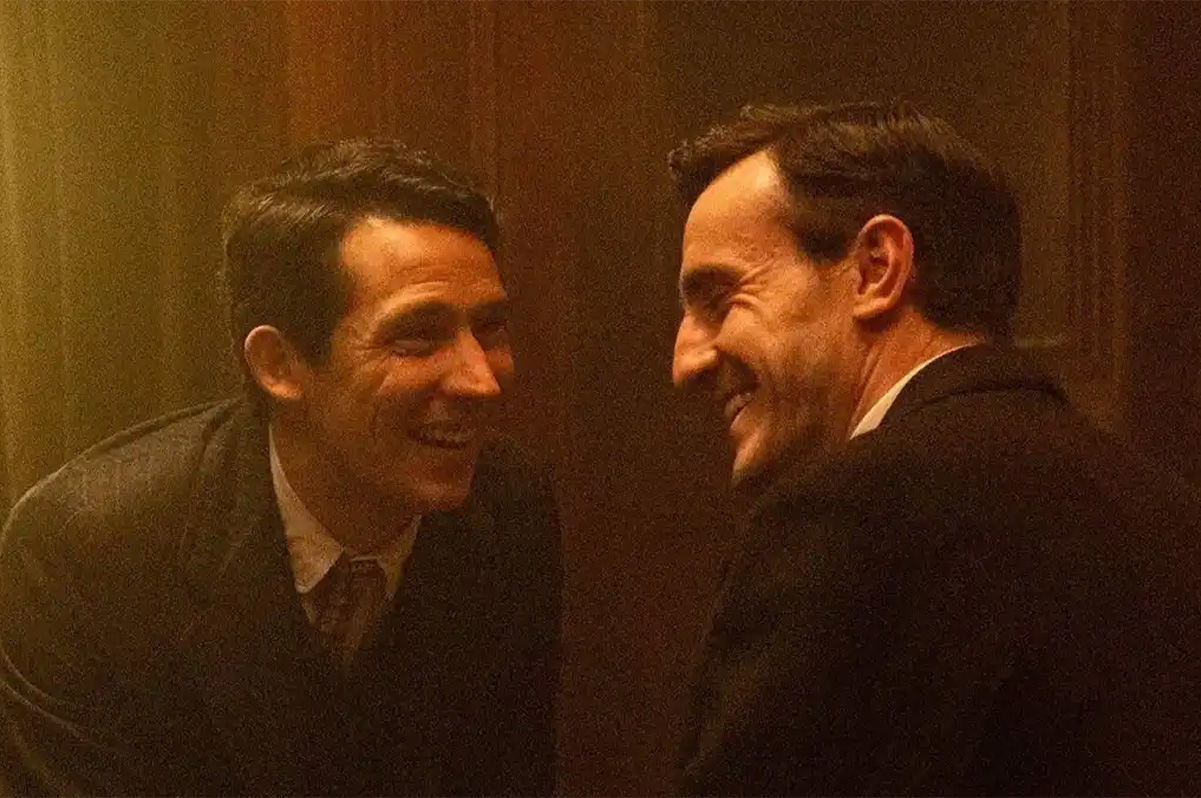
To most of us today, folk music is just another genre. We might have some general knowledge that it originated as rustic traditional songs handed down across generations, but few of us likely think much about it beyond that.
If we did, we might recognize how much human experience, with all its joys and sorrows, was wrapped inside those traditional tunes, and how many private emotions are refracted in them through each link in the human chain that passes them down – and that is what “The History of Sound” (Oliver Hermanus’ new film, starring Paul Mescal and Josh O’Connor) tries to convey. It’s an esoteric idea, to be sure, but the South African director (whose film “Beauty,” won the Queer Palm at Cannes in 2011) has a sophisticated cinematic vocabulary capable of getting it across, and it certainly helps that he uses a sexy and passionate queer love story as the vehicle to take us there.
Set in the years around World War I, it’s the story of Lionel (Mescal) and David (O’Connor), two music students who meet at college in 1917; Lionel comes from humble origins in the farmlands of Maine before, while David is a young man of status and means, yet it’s as close to love at first sight as you can get. They strike a spark together that only grows brighter as their passion for music bonds them deeper. Of course, it’s 1917, and history is about to get in the way. War is declared, the college is closed, and David is called to active service in Europe, while Lionel returns home to a farm that’s declining along with his family’s already meager fortunes.
After the war, David returns, world-weary from his time in the trenches but eager to get back to his musical studies – and to Lionel, whom he asks to accompany him on a trip through rural Maine to collect local folk songs by recording them on wax cylinders for study and for posterity. Their journey together is idyllic; they connect deeply with the music – and the people – they encounter and record along the way, and embrace their love for each other without reservation. When it ends, however, they go their separate ways.
From there, the story leaps ahead, following Lionel as his academic career takes him to Europe and a life he never dreamt of – all the while haunted by memories of David. Eventually, fate provides a thread that might bring them together once more – leading him to hidden secrets that cast a whole new light on their love for each other, and that add yet another layer of personal meaning to the folk songs that once brought them together.
It would be easy to play up the sex appeal of the lead couple Hermanus scored to enact his heartfelt opus about love, music, and an eternal thread of shared human experience – indeed, the press around this buzzy movie, which was a favorite at this year’s Cannes festival (where it was nominated for the Queer Palm), has focused most of its attention on the chemistry between its two “It-Boy” stars, neither of whom publicly identifies as queer but who have both established themselves firmly as dedicated to the authentic portrayal of queer experience.
That chemistry, unsurprisingly, is epic. Mescal, whose irresistibly masculine appeal is deepened by the vulnerable sensitivity he brings to his characters, both here and in previous films (such as the haunting “All of Us Strangers”), melts our hearts and wins our respect with a performance that feels almost sacred in its stubborn refusal to abandon queer hope; O’Connor, who so searingly welded us to his struggle over homophobic self-loathing in “God’s Own Country” long before his stint as Prince Charles on “The Crown” or his bisexual-teasing turn in “Challengers,” provides a tantalizingly opaque portrait of “prudently” compliant queer identity, coupled with an implied-but-essential element of “don’t ask, don’t tell” which lends the whole thing a tragic air of compromised resignation. Yet the combination somehow evokes our own deepest fantasies, our true-romance daydreams of finding a queer “eye of the hurricane” in which it is possible to live our truth, shielded from the strictures imposed by the larger society.
Inevitably, there are comparisons to be made with “Brokeback Mountain,” the quintessential tragic gay love story that shares its contrast of pastoral bliss and societal obligation and mirrors the star-crossed romance which drives it; and while we’ll be the first to say that we wish we no longer had to see bittersweet onscreen queer love thwarted by tragedy, timing, and social convention, we can’t deny that it’s important to be reminded of the reality that has made that trope so eternally relevant – especially in a time when any advances we may have made toward living an open life have been critically endangered by a political climate that seems bent on rolling us all back into the closet,
In any case, it hardly matters. “The History of Sound” might move a bit too slowly for some tastes, or indulge in its fascination with music a little too deeply to suit those who are just there for the love story, but it ultimately succeeds in making us identify with its lovers’ boldness to embrace their lives fully, and the sanctuary they provide for each other behind the camouflage they must maintain in the larger world. It’s the tightrope of living in a homophobic society, rendered vividly in Hermanus’ leisurely-paced, deeply compassionate, and utterly heart-stirring period narrative – adapted for the screen by Ben Shattuck, from two of his own short stories – and left in our laps to contemplate as the final credits roll.
What elevates it beyond that bittersweet validation of queer love, in all its devastating cultural inconvenience, is its profoundly felt embrace of music as an ongoing record of human existence; “The History of Sound” is also a history of hardships and sorrows, of hopes and dreams and inspirations, and by invoking that continuous thread of lived experience, binds it to the long-obscured reality of queer love that has always existed outside the margins, reminding us that we’ve always been part of an ongoing story that is still being written today.
In all its candid melancholy, it reminds us that we are and have always been a part of the whole, despite the objections of small minds and societal acceptance, and that’s more than enough to justify all the industry buzz that precedes it.
And if you need more encouragement to see it, that spitting scene is pretty hot, too.
a&e features
C’mon, Dallas! Wesley Smoot brings Unleashed LGBTQ+ queer business conference & festival to the Lone Star State
Unleashed LGBTQ+ creator Wesley Smoot spills the (sweet) tea on organizing a queer cultural movement deep in the heart of Texas.

The Los Angeles Blade is trading palm trees for cowboy boots as Publisher Alexander Rodriguez heads deep into the heart of Texas for Unleashed LGBTQ+, Dallas’s unapologetically queer answer to your typical business and entertainment conference (queue Chappell Roan’s Pink Pony Club dance remix). Founded by the ever-hustling and ever-bustling Wesley Smoot, Unleashed is where LGBTQ+ thought leaders, disruptors, celebs, and creatives kiki and coalesce to mix strategy with sass, all while redefining what it means to lead and live ever-loud and ever-proud in today’s rather regressive social climate. At a time when queerness is still being legislated, debated, and silenced, Unleashed LGBTQ+ is jacking up the volume full blast. And the Blade is here and queer for it. Let’s get a little unleashed with Wesley Smoot.
Unleashed is quite the queer powerhouse. What was the moment or impetus that birthed the idea to create Unleashed LGBTQ?
I saw so many impressive queer artists and entrepreneurs doing amazing work, and I felt that if there was a platform to amplify all their latest projects, how impactful that would be. It was around 2019, and I was writing a review about a vodka brand, and it hit me – let’s work to feature all these people in one place. We can learn about these projects, products, and ideas, and attendees can connect with one another at the same time.
How does Unleashed challenge the narrative of what it means to be queer in Texas, especially in a city like Dallas, which has such a unique queer history?
Dallas really does have a history! And I think it’s great to pull people in to see what a vibrant queer history that is. Places like S4 and Round Up Saloon have been around forever! As for Unleashed, many of the people coming into Dallas for the event are not aware that it has the sixth-largest LGBTQ+ population in the nation. When they see the scene, they’re often surprised. When they hear a lot of our stories, I think they’re surprised but also inspired.
You’ve made yourself quite committed to championing underserved communities. How do you incorporate that passion into Unleashed’s programming and partnerships?
We aim to host discussions about things we feel are relevant. I think this can be tough because when it comes to equality, some of these conversations can be depressing. No less, there are issues we need to address and conversations we need to have. Discussions about marketing, media, culture, and entertainment can be educational and entertaining. We always make sure to include non-profit organizations like HRC and The Trevor Project.
Unleashed was created as a virtual event during the pandemic, then became an in-person festival in Dallas in September 2023. What lessons did you learn from that virtual-to-live transition?
I had more experience with live events. I actually had to teach myself how to run the back-end of a virtual event – this was a very intense crash course. Learning many new skills in a very short amount of time was difficult, but it’s funny how much confidence that can give you moving forward. I do think that starting with virtual gave me a much clearer idea of how I wanted to format the programming.
Half of 2025 ticket revenue is going to the Human Rights Campaign. What motivated this charitable move?
I have always admired the work HRC does. But really, I think when people see that there is a fun, cool event that is benefiting a cause that they believe in, it makes it a lot easier to get their attention and motivate them to join us for a fabulous event.
As we touched on, the Dallas–Fort Worth area has a strong LGBTQ+ history, with roots dating back to early pride parades and growing grassroots activism. How does Unleashed add to or impact the local Queer community and scene?
I think we add to it by sparking conversations on live stages through panel discussions. Some of those conversations have a lot to do with LGBTQ+ history, non-profits and the impactful work they do, queer artists and the new projects they want to promote. We bring a lot of these people together, whether local or flying them in or getting the locals involved. Dallas has so many heavy-hitters in the non-profit and entertainment sectors.
Unleashed combines business networking, entertainment, advocacy, and culturally relevant brand activations. Why is it important to have this intersectional space, especially in today’s intense political climate?
I think it’s important to talk about how this political climate is affecting us all, even if we are in different industries. LGBTQ+ is the common thread at Unleashed, and when attendees connect at our events, they can see and share their experiences with each other. I know a lot of people have found business opportunities at Unleashed, but also support systems.
Queer folks in the South have always had a different kind of resilience. How does Unleashed highlight the Southern queer spirit that often gets overlooked?
I feel like there has been some representation in the media to show the rest of the world about the gay South when you look at Drag Race, True Blood, and other television programs, but I would love to see more. So much of that resilience comes from queer folks who grew up in small towns and had to deal with bullies, their parents’ expectations, or the church. Those experiences stay with us forever. They contribute to making us who we are, for better or worse. I like to think the events we host have plenty of that southern flavor. It’s more important than ever to feel that we have a safe space.
Texas has not always been seen as the most welcoming place for LGBTQ+ folks and yet here we are, throwing a super queer extravaganza in the heart of it. What does that say about where we are as a culture and where we are headed?
That’s a tough one. I got chewed out in the comments section on Linkedin, someone telling me: “How dare you throw this event in Texas with everything going on there?!!” I replied, “Because of everything going on, it’s more important now than ever to host these events in Texas, or Florida, or anywhere else that people may need a safe place to get together and connect.”
I live in Texas. Should I plan an event of this size in a place I don’t live? Seems counterproductive to me, but we are very proud to host this in Texas. I have met people from all over Texas and the surrounding states. Since we do so much with entertainment, it is great to see the people who come in from New York and LA as well. I hope Unleashed LGBTQ+ can continue to grow as an event and as an organization, and I hope the tolerance and acceptance in the Lone Star State continue to grow with us. We’re not going anywhere.
The Los Angeles Blade will be on site for Unleashed LGBTQ SEPTEMBER 19-21, 2025 | DALLAS, TX Get your tickets here
Movies
‘The Rocky Horror Picture Show’: Michael Varrati on why the queer, camp classic still resonates 50 years later
“You got to let your freak flag fly,” says Varrati

As the Halloween season approaches, many queer horror fans will surely be revisiting The Rocky Horror Picture Show. And given its 50th anniversary, the timing couldn’t be better, with a new restored version in 4K courtesy of Disney, and several events and screenings happening in Los Angeles.
To discuss the many merits of Rocky Horror, you’d be hard pressed to find somebody more passionate than screenwriter, producer and filmmaker Michael Varrati (credits include Christmas with You, The Wrong Stepmother and The Boulet Brothers’ Dragula). He’s also the co-host of the biweekly podcast Midnight Mass alongside Peaches Christ, where they dig into their favorite cult movies and bring on guest stars.
Varrati sat with the Blade and recalls the first time he watched The Rocky Horror Picture Show in his rural hometown, dishes on the film’s specific impact on the LGBTQ+ community, and explains why 50 years later, we’re still talking about Dr. Frank-N-Furter.
Where did you first discover Rocky Horror, and how did that influence your career and overall taste in film?
When you think of cult fandom, especially in the film space, in the movie space, Rocky Horror is very singular. In so many ways, it led the charge. My first sort of interaction with Rocky was when MTV was doing coverage of one of the anniversaries — I imagine it was probably for the 20th or around that time. I was a teenager living in rural Pennsylvania and I would see this coverage around Halloween, and I was fascinated as much by the movie as I was by the fact that people were dressing up and going to the cinema to participate. And when you’re living in small town America where there are no theaters to be found doing that, there was some sort of sense of the forbidden, or it was just out of reach. But I obsessed about it, so I got a copy of the movie on VHS, and I used to gather friends — probably the theater kids, the drama club, any associated weirdos. And I say this lovingly, because I was one of those weirdos! And we would watch it in friend’s living rooms and in basements, and we would try and do our own version of celebrating the movie in a theater style at home. It wasn’t until I went to college at Kent State University that I started going to the midnight screenings in Cleveland at the Cedar Lee Theatre, and I immediately connected with the vibe of what was going on. I loved that this was more than just a movie to the people who gathered. In many ways, that fundamentally helped me understand that the art we connect to can be so much more than a passive experience.
I actually recently graduated from Ithaca College, and they always had midnight screenings around Halloween. I got to go to one of those and it was really fun. I’ve never quite had an experience like that.
They really are one of a kind. Obviously, midnight movies existed before Rocky, and now exist sort of in the wake of Rocky. I believe the original midnight movies were Night of the Living Dead, El Topo, Pink Flamingos. But Rocky was sort of the first time when that programming became a tangible experience. People were going to the movies, they were dressing up as the characters, they were shouting at the screen, and people weren’t getting mad about it. They were shouting too! And it created this interesting economy of celebration that we see a lot of other places and films try and mimic. We’ve seen it kind of rise up for other movies, but it’s never quite caught the way that Rocky did. And I think the reason Rocky is singular is that it was totally organic. You can’t manufacture the experience after the fact. People found the movie and the movie found them.
Especially knowing the iconic place it has within the LGBTQ+ community, and the aspect of people dressing up and going to see these shows in full costume. Could you speak to that?
When I think about the significance of Rocky, I, of course, love the movie. But I think one of the most powerful things about it, especially for a particular moment in time, was that it provided a communal space a lot of people didn’t otherwise have. It’s really easy in the modern era, even in rural places, to use the internet to connect with your community if you know where to look. We know now about queer spaces and platforms and sites, but at a specific time when those were not readily available — and in many places, it was very scary to go looking for those things because you didn’t know how you were going to be met — there were few places that felt like safe harbors. And when Rocky Horror started becoming that space, I think that became really significant to its history because it became a gathering point for LGBTQ+ people. For punks, for goths, for anyone who felt marginalized or othered by society. When you walked through those theater doors, you belonged, and everybody accepted you, and the thing that made you feel like a freak was celebrated. You got to let your freak flag fly, and so I think for so many people of a certain generation, Rocky was the first place where they got to go find chosen family. They got to find and develop a sense of community. Because for so many, it was not a viable option. And to the outside world who maybe didn’t connect with that aspect of the movie, it was a good way to fly under the radar if you didn’t want people to fully know why you were going because you’re just going to a midnight movie. It’s not like you’re going to the gay bar that everyone in town knows or vilifies… you’re just going out with some friends to a movie. But secretly, you’re finding your community.
I think that’s a great way of putting it. The movie is celebrating its 50th anniversary this year, and there’s quite a few events happening, including an Academy Museum screening on the 26th with some of the cast. Could you speak to the legacy of this film over time and why people are still finding so much enjoyment in it?
In so many ways, it is as bold as ever. There are aspects of it, of course, to the modern audience that maybe haven’t aged as well or are problematic. But nonetheless, there are things about the movie that are so celebratory. This movie isn’t just a place where outsiders can celebrate — the movie itself, in the pantheon of film, is sort of an outsider. It is this subversive anomaly. It was a critical failure, and it was kind of a commercial failure, yet somehow it persisted. Its persistence is, in a lot of ways, akin to resistance. The idea that queer joy is an act of resistance. Queer persistence is an act of resistance. By being the strange movie, by thriving in spite of an industry that said it couldn’t, it’s something people really appreciate that history of and continue to gravitate to. But then for newer audiences who see it, the music’s fun, the characters are fun, and it still feels pretty audacious as ever. But also, the message of “Don’t dream it, be it,” is timeless.
I’m curious to hear about this movie’s relationship to camp, because now I think that word gets overused a lot, and some films try to manufacture it. And as you said, this film was able to capture an experience so organically.
There is, to some folks, a prevailing idea that you can’t intentionally make camp. But I don’t know that that’s entirely true, because we see people like John Waters — he can intentionally make camp. There are folks who get the DNA of what camp is. But a lot of times, camp happens by accident. Because I think most camp, all camp, in a lot of ways, is born out of earnestness. And I think that’s what happens when people try to manufacture camp and it fails because they’re missing the fundamental element of earnestness. If you look at any of these movies that have become camp classics, they’re not winking at you. They’re not trying to say, “Hey, this is so bad, it’s good!” They’re not trying to make you know that they’re in on the joke. They’re presenting something with their whole chest and they believe in what they’re putting out there, and it just is what it is. And we find the ridiculousness through the heightened presentation. Rocky is really special in that it is truly camp, because it is, in so many ways, an homage to classic monster movies, classics and drive-in cinema. It is through the experience of these two small town people who are sheltered and are now experiencing something that they consider to be so other and overwhelming — but for everybody inside the castle, that’s every day. A really fun way to experience Rocky is understanding that the camp is not necessarily intentional, but also absolutely intentional. It’s sort of a lampooning of the normalcy of the world outside, because the truth is normalcy is the ultimate camp, because it’s a fallacy. Nobody’s normal. What is normal? What’s it mean? Brad and Janet, when they finally get to be themselves, are just as freaky as everybody else inside of the castle. It’s a revealing of truth, and I think part of that revealing of truth is what makes the movie so special to people.
Recently, there was a CBS Sunday Morning Special featuring Tim Curry, but of course not all of the actors are with us to promote the anniversary. What do you think of the cast’s relationship to this film over the years and what performers like Curry are able to do for new generations?
I love that Barry Bostwick, when he speaks about this movie, says there’s no happier place to be than a midnight screening of Rocky Horror. I think that there’s something significant about somebody who made this, who can see that it has gone beyond him, but has created so much love, community and celebration for people. A couple years ago on Midnight Mass, we had Patricia Quinn, who plays Magenta. But of course, when you’re talking to Patricia Quinn, Rocky Horror invariably comes up. From my perspective, it seems that she is constantly amused and grateful for the fact that this movie rings perennial in her life. It is a constant. The cast’s overall embracing of this film has been crucial to its success as well. We often see folks who make these movies that are initially rejected by culture at large (Faye Dunaway and Mommie Dearest is a great example) not get to appreciate the celebration and reappraisal as it’s happening. And so I almost feel bad because they miss out on this thing that has become important and meant so much to so many people. It’s really great to know that so many cast members of Rocky Horror, from the beginning, saw the movie didn’t do super great, and then became a thing within five years, and they just said, “Hey, it’s going to be what it’s going to be, and we’re along for the ride.”
Lastly, as someone who loves film, what are some other projects that you feel have been especially inspired by Rocky Horror and authentically embraced its spirit?
You know what’s funny? I think about the influence of Rocky Horror in the landscape of cinema, especially cult cinema, often because — I think directly or indirectly — we see the film’s impact through the work of people who were probably at one time audience members. For example, Darren Stein, the writer and director of Jawbreaker (which itself is a cult classic) is a huge fan of Rocky Horror, and has spoken openly about Rocky‘s influence on him and how it creeps its way into his work. And when you watch Jawbreaker, Courtney, the character played by Rose McGowan, has an energy akin to Frank-N-Furter, and some of the lines that she delivers are verbatim Frank-N-Furter lines. I’m sure that was intentional on Darren’s part, but there’s so much of that in pop culture. I know that when Richard O’Brien was doing voices on Phineas and Ferb, of all things, something that’s so far from Rocky Horror, when they would do Halloween episodes, the creators — themselves Rocky Horror fans — would include commentary and easter eggs into this Disney show that relate back. And so whether it’s through direct cast involvement or creators, I see the level of influence it’s had. And even in shorthand, I remember talking to someone recently about the movie Showgirls and the comment came up that Elizabeth Berkley’s commitment to performance was a Frank-N-Furter level commitment — that’s become a shorthand for how we describe certain performances. And that, to be clear, was a complimentary comparison. For people who are invested in these kinds of movies, to be compared to something like Rocky Horror with its longevity is maybe one of the greatest compliments of all, because no one’s ever going to make a cult film like Rocky Horror, right?
Movies
Short film explores little-known corner of AIDS history
‘Cashing Out’ explores terminally ill patients selling their life insurance policies
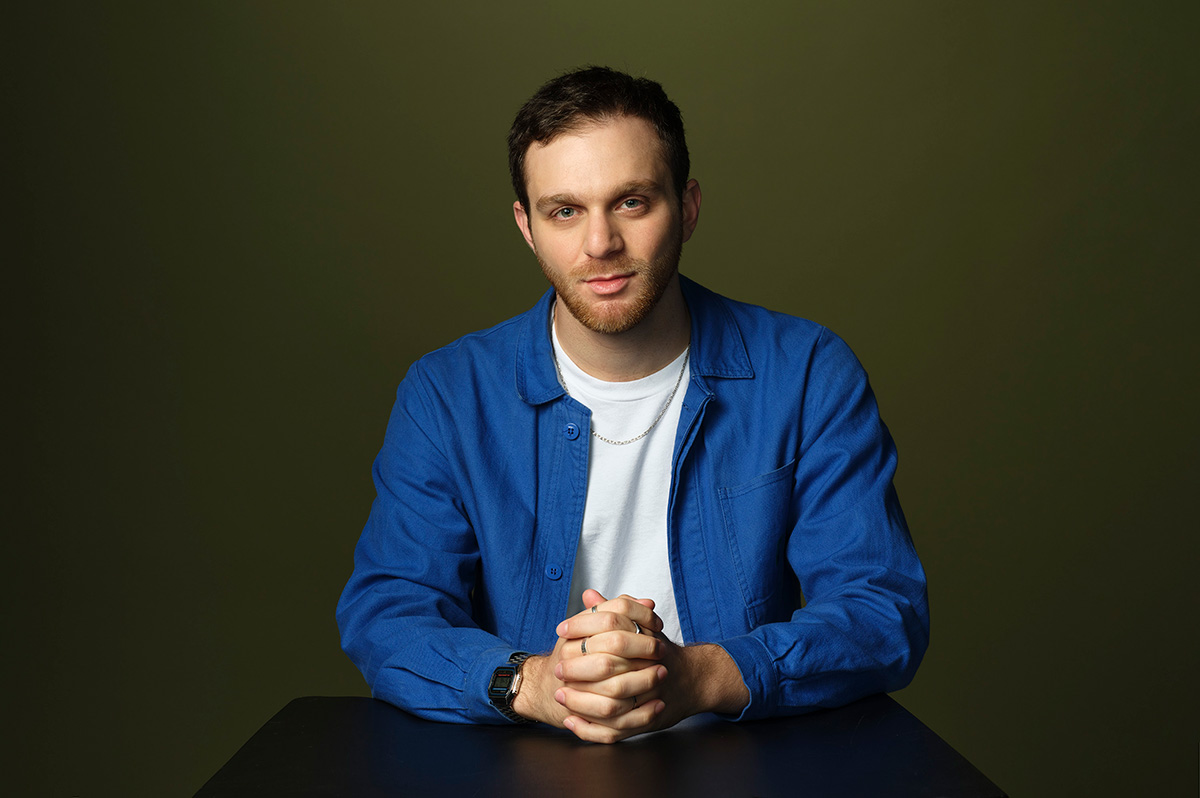
If you’re reading the Blade right now, you’re probably someone who understands the importance of preserving queer history – especially in an alarming time when the danger of having it erased is uncomfortably real.
That’s why a new, Oscar-qualified documentary short from queer Gen-Z filmmaker Matt Nadel feels incredibly timely.
Nadel, a 26-year-old journalist and filmmaker whose work focuses on justice, survival, and untold queer histories, has had his films distributed by The New Yorker, The New York Times, and PBS; his short “CANS Can’t Stand” premiered at Cannes as part of the festival’s Emerging Filmmaker Showcase, and earned a nomination for a 2024 GLAAD Media Award after winning audience awards at Outfest and NewFest. Now, with “Cashing Out,” he follows an unlikely thread in his family history to unearth an almost-forgotten chapter in the saga of the AIDS crisis.
Centering its focus on a group of AIDS-era survivors and witnesses, “Cashing Out” explores the origins of the viatical settlement industry – in which a terminally ill person may sell their life insurance policy to a third party investor, who can then cash in on the policy at the time of the seller’s death – through their individual stories. There’s Scott, who facilitated such an arrangement for his dying partner and inspired a widespread movement within the gay community to follow suit; Sean, who sold his policy but survived to become a pioneering queer activist, publisher, and entrepreneur; Dee Dee, a trans woman of color who was one of the millions of lower-income AIDS patients had no life insurance policy to sell; and Nadel himself, whose own father invested in the purchase of policies from terminal AIDS patients.
It may seem like a macabre way to make a profit – indeed, as the film makes clear, it was characterized that way in the media at the time, and perceived by many as “profiteering” which exploited an epidemic of death. Likewise, as Sean’s story illustrates, breakthroughs in treatment allowed many of the policy holders to survive, and with a diagnosis no longer equating to a death sentence, investors could no longer rely on getting their payout. Yet it was also an opportunity for men who would otherwise spend their last months suffering in poverty to instead live what was left of their lives in comfort, free from the inevitable financial disaster of forced unemployment and expensive medical bills; decades later, the industry is going strong, to the benefit of millions of elderly and terminally ill people as well as their investors.
In “Cashing Out,” each of its participants traces their connection to the viatical settlement movement of those dark days to illuminate how it has shaped their own evolution into queer advocacy and activism; beyond that, the film explores the oppression and hardship of the AIDS-era queer community in the context of what we face today.
Nadel says: “I had never heard about this industry until I discovered a few years ago that I had an unnerving personal connection to it. Making this film allowed me not only to reckon with something personal, but also to connect AIDS history to timely questions around care, equity, and the cost of dignity in this country. Right now, those questions could not be more relevant.”
Part of the award-winning New Yorker Documentary series, and executive produced by Matt Bomer, Angeria Paris VanMichaeld, and Oscar-nominated filmmaker Julie Cohen, the film also marks a milestone partnership with the National AIDS Memorial, which has launched a new intergenerational storytelling campaign called “The Quilt Can Be A Comforter.” In addition, The Life Insurance Settlement Association (LISA) joined the campaign as the presenting sponsor.
John Cunningham, executive director of the National AIDS Memorial says: “The National AIDS Memorial is committed to sharing the story of the AIDS crisis and the lessons that can be learned from it. As a man who lived through the darkest days of the AIDS crisis, I remember firsthand the struggle many faced and how the viatical process presented both challenges and opportunities.”
Bryan Nicholson, executive director of LISA, comments: “Cashing Out” shines a light on a profoundly human chapter in the life settlement industry, when people with AIDS faced impossible choices. For LISA, supporting this film was essential—not only to honor the origins of our industry, but to ensure those stories are told with compassion and dignity.”
Highlighting the fragility of progress, Nadel’s 40-minute documentary illustrates how the same social prejudices and systemic inequities that cost so many their lives in the ‘80s and ‘90s are still very much with us today – especially with political threats jeopardizing our continued access to HIV treatment and prevention. In the words of its press release, it’s “both a memorial and a call to action, urging us to safeguard care, preserve funding, and ensure that no community is left behind.
It’s also an important reminder of how much queer history matters, and how important it is for queer voices to be involved in preserving it.
You can watch “Cashing Out” for free at cashingoutmovie.com.
Arts & Entertainment
A very queer night at the Emmys
Tillman makes history; Cumming wins for ‘Traitors’
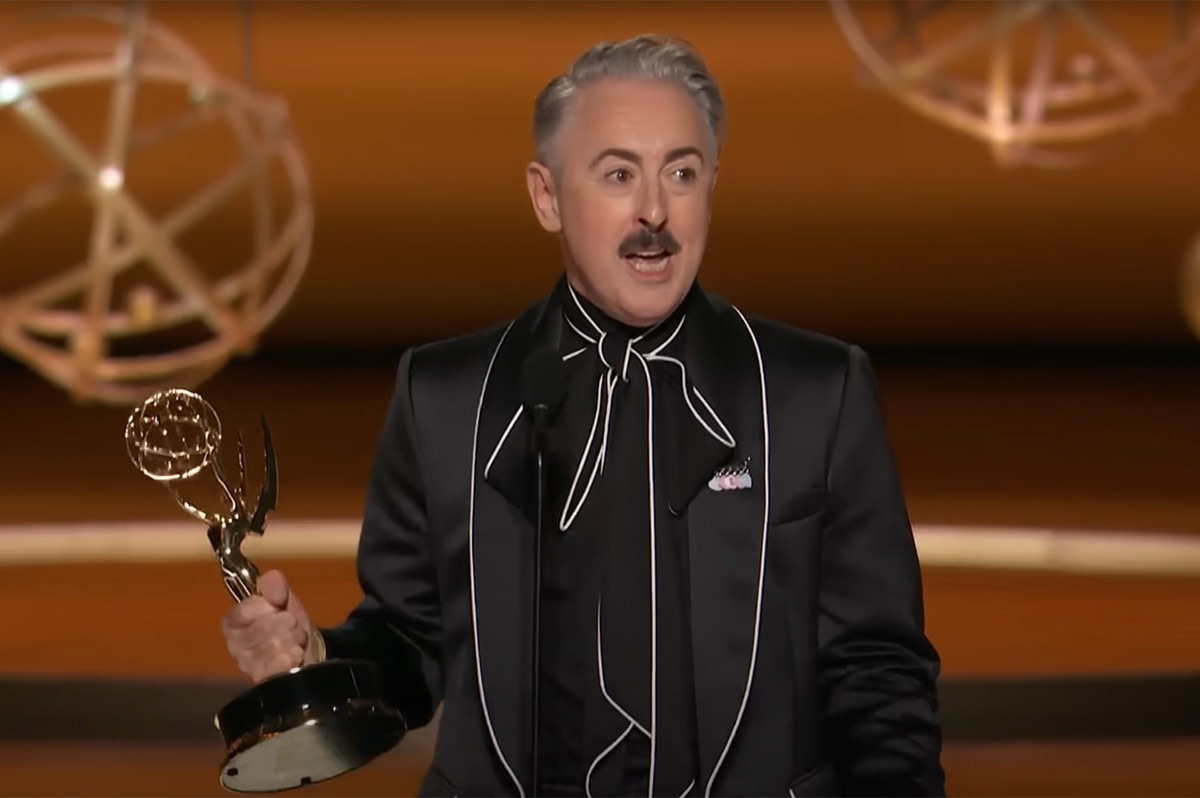
When “Severance” star Tramell Tillman became the first gay Black man to win for Best Supporting Actor in a Drama at the 77th Primetime Emmy Awards, the first person he thanked was his mother.
“Mama, you were there for me when no one else was and no one else would show up,” the first-time winner said onstage, during his acceptance speech.
“Your loving kindness stays with me, and this is for you. Thank you to the Academy. I am full. I am humbled. I am honored. And as my mama would say, ‘Whew. Look at God.’ Thank you.”
Backstage in the pressroom, Tillman said he was “on cloud nine” and “still processing” the historic win.
“I am fortunate to be in the company of such great actors that have gone before me, like Andre Braugher, Ossie Davis, Michael K. Williams, that have done beautiful work, and those that are still with us today, like Giancarlo Esposito and Jeffrey Wright,” he said.
“These men, I’ve been taken by their work for years, and I borrow from them. So I’m just honored to be in the class.”
Tillman also mentioned the “importance of taking a chance on yourself,” adding he was “told that I would never make it as an actor, that it’s a career that leads to a dead end.”
But after seeing his classmates pursue their dreams, he realized it was time for him to take a chance, “I’ve learned there are no guarantees in life, but you continue to take a chance to see what happens.”
Another first-time LGBTQ winner who was thrilled with her win was “Adolescence’s” Erin Doherty, who won the Emmy for Outstanding Supporting Actress in a Limited or Anthology Series or Movie.
Doherty thanked her girlfriend Sinead Donnelly onstage. “Sinead, thank you for making me the happiest person in the world. I love you with everything I’ve got,” she said lovingly.
In addition, a visibly shocked Jeff Hiller won Outstanding Supporting Actor in a Comedy Series in “Somebody Somewhere.”
Thanking his “sweet husband,” Hiller said: “I feel like I’m going to cry because for the past 25 years, I’ve been, like ‘world, I want to be an actor!’ and the world’s, like, ‘maybe computers.’ I just want to say thank you to HBO for putting a show about sweaty middle-aged people on the same network as the sexy teens of ‘Euphoria!’ Thank you to the Duplass brothers, Carolyn Straus, and Hanna Boss and Paul Thureen who wrote a show about connecting and love, in this time when compassion is seen as a weakness.”
Alan Cumming picked up his second Emmy for hosting Peacock’s brilliant competition show “The Traitors.”
“Thanks to everyone who watches the show. Thanks to all of the people who have ‘Traitors’ parties and dress up as me. We see you. We love you!” he told the audience onstage.
Cumming is also an executive producer on the competition series. “Thank you to our crazy cast and our crew in Scotland who had to understand the concept of the Scottish summer is sometimes oxymoronic,” he quipped.
He also sent loving words to his hubby. Thanking his husband Grant, “who brings joy into my life every single day,” Cumming acknowledged that this was a difficult time we live in. But “it’s so great that our show brings a little bit of joy into this life.”
In the pressroom, Cumming was asked who he thinks should join the show, Cumming responded, “I’m sure our president would be very good on the show. Having a lot of chaos and sort of turmoil and treachery, so maybe he’d like to come on and be paid for that, probably better than he gets as president.”
At the awards show, Cumming supported trans rights, wearing a decorative pin to the lapel of his dapper tuxedo.
While this next season will be full of celebrities, the following season of “The Traitors” will feature regular people rather than Hollywood types.
Around town, there was a plethora of gifting suites activity, with numerous LGBTQ nominees and vendors.
“After 25 years of producing the official Grammy’s gift lounge, it feels like a full circle moment to be able to add something as prestigious as the Emmy Awards Giving Suite to our roster,” said organizer Lash Fary.
“To still be expanding our scope after all these years is a testament to how gifts make people feel … something that isn’t simply a trend. I’m incredibly proud of this new relationship and that sharing gifts I love with talented people I respect is something that allows me to live a beautiful life.”
Theater
The Palm Springs historic Plaza Theatre to reopen, celebrating its past by looking to the future
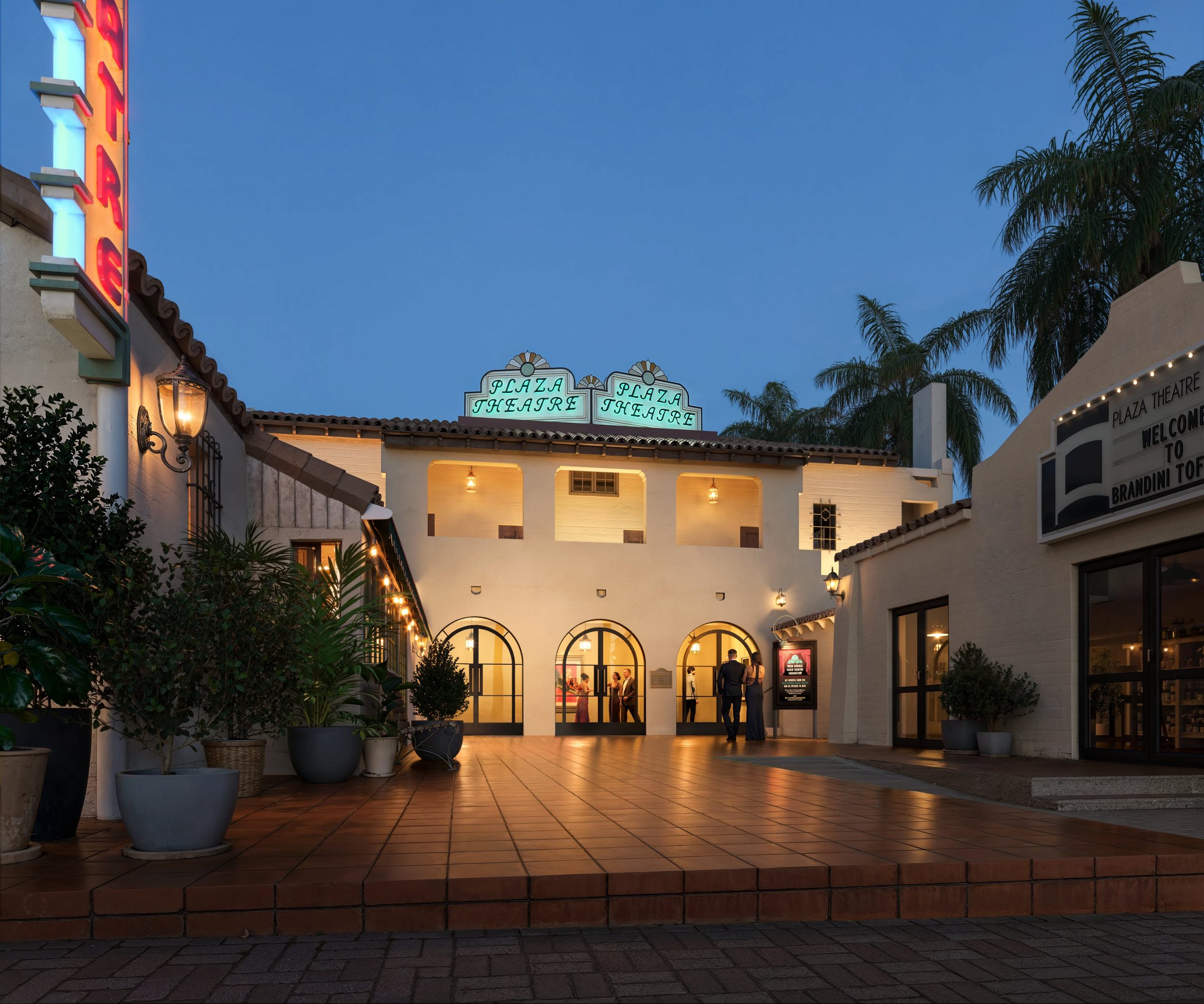
From the 1930s, Palm Springs has been the luxury and private oasis for Hollywood’s elite. Due in part to a clause in most actors’ contracts that they remain within a two-hour driving distance from Los Angeles, the city was also well known for keeping secrets. With a long list of classic stars that include Frank Sinatra, Marilyn Monroe, Elvis Presley, Bob Hope, Lucille Ball, and many more, to modern-day A-listers, Palm Springs remains the “it” location to play.
Part of the city’s Hollywood history is the historic Plaza Theatre, situated right in the heart of town on Palm Canyon Drive. Since 1936, the Plaza Theatre has welcomed Hollywood’s golden age of celebrities. The venue quickly established itself as the place legends were seen when it hosted the world premiere of the Oscar-winning film Camille, with the film’s star, Greta Garbo, reportedly slipping in while the lights dimmed. Bob Hope, Jack Benny, Bing Crosby, Frank Sinatra, and more have graced its stage.

This writer remembers sitting with anticipation as the star-lit ceiling twinkled, and the heavy velvet curtain rose to feature a cast of vaudeville and screen veterans, all aged 55 or more, for the famed The Fabulous Palm Springs Follies, which took residency at the Plaza for 23 years.
Sadly, the Plaza closed in 2014. The building has remained empty, with rumors of bringing it back. Well, the rumors are now fact. Under renovation for the last year, the Plaza Theatre will reopen this December, under management by Oak View Group in partnership with the Palm Springs Plaza Theatre Foundation and the City of Palm Springs.
The majority of the funding for the renovation and reopening has come from the community, with donors contributing amounts ranging from $50 to millions of dollars; a true testament to the community coming together to celebrate the Plaza’s legacy. Getting the ball rolling was a $5 million donation from the co-creator of Wings and Frasier, David Lee.
One of the leaders of the renovation is John Bolton. Bolton, a Senior Vice President for Oak View Group, was brought to the Coachella Valley to oversee the $300+ million Acrisure Arena project and the launch of the Coachella Valley Firebirds hockey team. He has since gotten involved with the Palm Springs Chamber of Commerce and Visit Greater Palm Springs, on a mission to support the community’s growth and local business development.
For Bolton, the Plaza Theatre project isn’t just about business; it has become personal. He shared with the Blade, “I love and adore Palm Springs. For me, getting the opportunity to be involved in this project is so meaningful. It’s so exciting and wonderful to have had this opportunity within a short amount of years to have such a great impact on the entertainment options for the entire Coachella Valley. I got involved in the Plaza project because our company, Oak View Group, donated a million dollars to their capital campaign. I got involved and got on the board and started doing fundraising, and it just kind of evolved from there.”
Bolton will now serve as Senior Vice President and General Manager of the Plaza Theatre. With a keen business sense and passion for the business community, he knows the importance the venue will have when it comes to the region’s economy.
“When you think about Palm Springs and the number of tourists that come here, people are really looking for things to do. This really adds to the tourism aspect of Palm Springs and really having things to do in the evening, which has always been something that I think all of our people involved in tourism have been looking to expand upon and have more opportunities.”
The venue is projected to welcome 135,000 attendees per year, estimated to provide more than $4 million in direct economic impact to the city through sales and transient occupancy taxes. The reopening will have a major positive impact on local small businesses, hotels, and restaurants. The Plaza will also host education programs for students of all ages, as well as community outreach events, engaging with underserved communities.
The renovation is extensive. It isn’t just changing the carpeting and slapping on a new coat of paint. It has been a meticulous process that involves preservation while adding cutting-edge innovations for patrons. They have uncovered a 1936 decorative stenciling around the stage and restored it; the Plaza has also added a new cooling system, expanded seating, modern dressing rooms, and a museum area featuring items from Hollywood’s past. But at the heart of all of the renovations has been the mission to keep the venue’s soul intact.
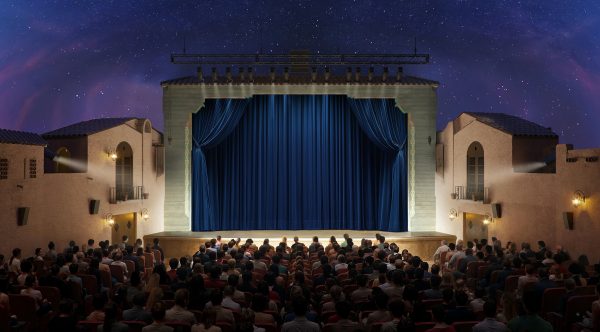
While paying homage to the venue’s past, the Plaza’s programming definitely reflects present-day Palm Springs. The venue’s first week of performances includes Lily Tomlin, Billy Porter, John Waters, and Fortune Feimster; clearly celebrating a certain aesthetic.
Bolton expands, “The demographic of Palm Springs is very LGBTQ-centric. I think that reflects a lot of our programming, but if you look over the vast majority of our shows, it appeals to, we think, everyone. But certainly, those are very popular among LGBTQ audiences for sure.”
On behalf of the Plaza Theatre, what is Bolton’s message to the community?
For me, it’s gratitude. Gratitude for the community stepping up and saying that this is a priority to restore this historic gem and get it reopened. It really is gratitude to everyone who has made this a reality. And then gratitude for those who will be supporting the theater going forward, either through continued donations or buying tickets.
The Plaza Theatre is set to reopen with a full lineup, starting the first week of December. For events and tickets, click here.

a&e features
Sandra Bernhard unpacks her anecdotal “Shapes & Forms” live show and why it’s more important than ever to reach straight audiences
“Everybody’s just sort of fried and burned out, and it’s only been five or six months since this all sort of cracked open,” Bernhard says of Trump’s presidency
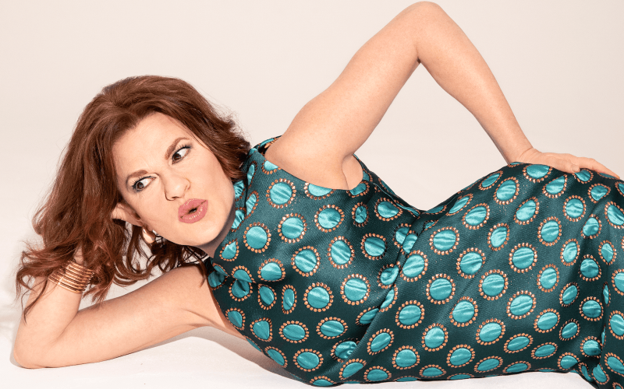
Sandra Bernhard knows there’s nothing quite like the power of live performance. And with her upcoming Sept. 29 stop at Oscar’s in Palm Springs on her Shapes & Forms tour, she knows she has plenty of material to work with, given the current state of the world.
“It’s that fine line and balance between really entertaining people, bringing them up and also still reminding everybody of the times we’re living in,” Bernhard tells the Blade. “I edit carefully because everybody’s just sort of fried and burned out, and it’s only been five or six months since this all sort of cracked open. So the whole thrust of the show is to bring people up and have it be more upbeat, personal, anecdotal.”
Bernhard’s upcoming live appearance comes after a banner year for the GLAAD-award winning actor, with notable roles in the breakout second season of Severance, RuPaul’s Drag Race and an upcoming performance in Josh Safdie’s Marty Supreme, which is already receiving early Oscar buzz.
Bernhard’s performances blend music and singing in a unique, eclectic way, with the band Sandyland Squad Band continuing to perform. “I’m not saying I was the first to do it, but I certainly was one of the first people to do it in a post-modern way. So I try not to really look around and see what other people are doing. It’s not helpful for me,” she says. “I don’t know if people are inspired by me, but I can only inspire myself.”
Returning to California with decades of success in her career makes this stop personal for Bernhard. “I worked in Beverly Hills as a manicurist on Canon and North Canon Drive, and I also first started performing at a place called the Ye Little Club, which isn’t there anymore. So while I was supporting myself by doing this day gig, and then I started doing my night gig, it was sort of a funny little insular world,” Bernhard says. “And I still have friends, women that I did their nails back in the ‘70s. Some of them are still around and I have lunch with them when I’m in town. It’s a really wonderful continuum of where I’ve come from and where I’m going.”
Bernhard first broke out as an actor in Martin Scorsese’s 1982 classic The King of Comedy. She starred in the dark comedy alongside Robert de Niro and received a coveted National Society of Film Critics Award.
“It was way ahead of the curve — very prescient about fame and people doing anything to be famous. And certainly we’ve gone over the top of that. I mean, it’s insane,” she says. “Social media influencers, people that really don’t have anything specific or important to say, have managed to forge careers for themselves in ways that almost don’t make any sense to me.”
She continues, not mincing words: “I think you have to roll up your sleeves and go into life as a young person and work … But with all these people who just seem to lay around all day on the internet and social media, I don’t have much respect for that. I think it’s lazy, ignorant, stupid. You’re not reading, you’re not elevating yourself or your intellect. I don’t find it in any way, shape or form inspiring.”
The King of Comedy not only put Bernhard on the map for on-screen roles, but also helped her expand into live performance. And as she prepares to take this next stop after bringing Shapes & Forms to New York and Massachusetts, she has her priorities set on which audiences she needs to reach.
“It’s more important for me to reach the straight audience than it is the gay audience in terms of opening them up to thinking about things in a new way. I mean, it’s a given that my gay following loves me and gets me and understands all the aspects of what I do and the nuances,” she says. “[People] connect with me because of my humanity, and it’s my humanity that means the most to me — especially right now — with people being snatched off the streets, being sent down to South America in violent situations, where people are dying in Gaza.”
Sandra’s SoCal dates:
September 27
Carpenter Center
Long Beach, CA
September 29
Oscar’s
Palm Springs, CA
-
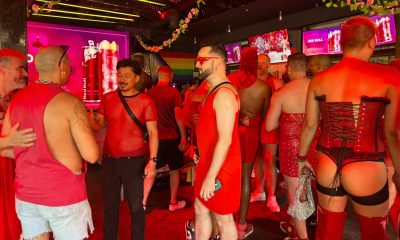
 Miscellaneous2 days ago
Miscellaneous2 days agoWest Hollywood’s Red Dress Day: a cocktail of queer euphoria, dance, and discontent
-

 a&e features2 days ago
a&e features2 days agoDavid Hernandez on sobriety, vulnerability, and the power of music to heal
-

 Commentary1 day ago
Commentary1 day agoPride & promiscuity: What the current face of gay sex culture says about us
-
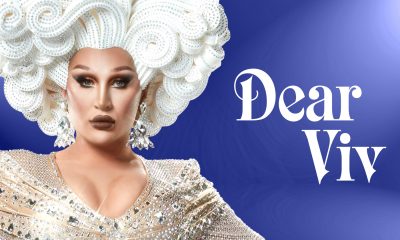
 a&e features1 day ago
a&e features1 day agoThe documentary ‘Dear Viv’ tells the story of a Queen and her community
-

 Movies7 hours ago
Movies7 hours agoCloseted cop struggles with an undercover life in ‘Plainclothes’
-
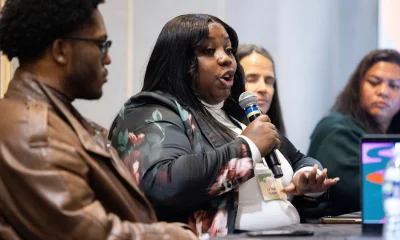
 Los Angeles County2 hours ago
Los Angeles County2 hours agoNew direct cash program aims to prevent youth homelessness in Los Angeles County



